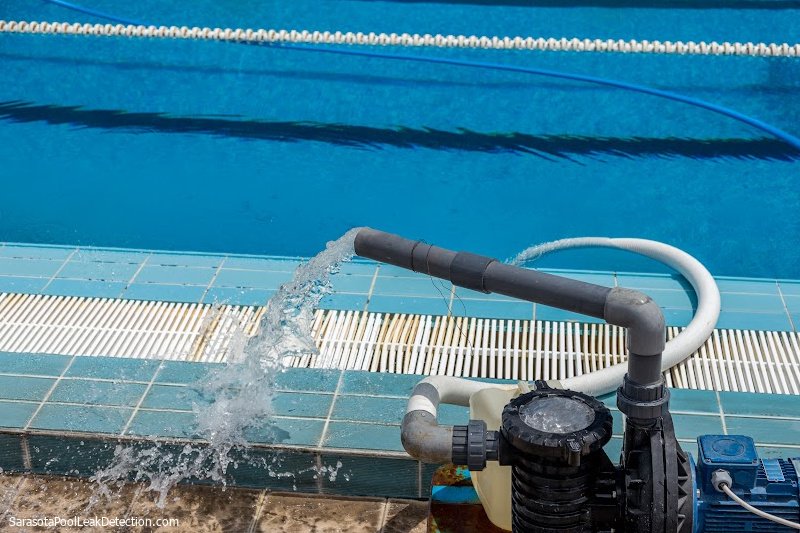Summer is the time for fun in the sun, which usually includes a refreshing dip in the pool. But what happens when your plumbing can’t keep up with demand? Suddenly that perfect pool day turns into a nightmare.
A pool plumbing should maintain pressure for at least 15 minutes at 35 p.s.i. or better. Pool plumbing works by using pressure to move water through the pipes. The pool filter also plays a role in keeping the water moving and circulating properly.
Pool plumbing is essential to the function of your pool. Yet it can also be one of the most troublesome parts of owning a pool. This blog will include how much pool plumbing can hold pressure, what to do if it starts to fail, and other tips.

How Much Pressure Should Be in a Pool Pipe?
The average PSI in a swimming pool is between 5 and 35. The plumbing lines should be tested at a level above the maximum working pressures to guarantee no leaks in the system. This is possible since materials like polyvinyl chloride usually comprise pool plumbing structures.

How Do I Know if My Pool Has a Pressure Side Leak?
Low flow rate, air bubbles in the filter, hazy water, and the pump not working when switched on are all signs of a pressure side leak. You may also notice wet spots on the ground near your pool or an increase in your water bill.
If you suspect a pressure side leak, hiring a professional pool inspector is best to confirm it. They’ll be able to use special equipment to pinpoint the exact location of the leak. Plus, they will also recommend the best course of repair.

Pool plumbing should be able to hold pressure without any problems. This way, you can ensure that the pool will have enough time to circulate the water properly and evenly. But, there are a few factors that can affect this time frame. These include the size, pump, filter, plumbing materials, and age of the pool plumbing.
Let’s find out how these factors affect pool plumbing’s ability to hold pressure:
5 Factors that Affect the Ability of a Pool Plumbing to Hold Pressure
Please include attribution to https://sarasotapoolleakdetection.com with this graphic.
Now that you have learned how to know if your pool has a pressure side leak, here are 5 factors to know that affect the ability of a pool plumbing to hold pressure.
1. Pool Size
If you have a small pool, your pool plumbing won’t have to work as hard as it would for a larger pool. This means that it will likely be able to hold pressure for a longer time. But if you have a large pool, your pool plumbing will have to work harder. It may not be able to hold pressure for so long.
2. Pool Pump
The pool pump type can also affect how long your pool plumbing can hold pressure. If you have a high-powered pool pump, it will create more pressure than a low-powered one. This extra pressure can cause the pipes to fail sooner. If you have a low-powered pool pump, it may not create enough pressure to keep the water moving correctly. This can also lead to problems with your pool plumbing.
3. Pool Filter
The pool filter type can also affect how long your pool plumbing can hold pressure. If you have a sand filter, you must replace it more often than a cartridge or cloth filter. These filters can cause clogging, putting extra strain on the pool plumbing.
4. Pool Plumbing Material
The material comprising your pool plumbing can also affect how long it will last. PVC is one of the most common types of pool plumbing materials. This material is strong and durable but can break down over time. If you have PVC-made pool plumbing, it should be able to hold pressure for at least five years.
5. Pool Plumbing Age
Finally, the age of your pool plumbing can also affect how long it will last. If you have an older pool, the plumbing may not be as strong as it once was. This means that it may not be able to hold pressure for as long as a newer pool would.
We already know several factors affect how long pool plumbing can hold pressure. Now, let’s find out how to test the pressure in your pool plumbing.

How Can I Test the Pressure in My Pool Plumbing?
If your pool isn’t performing as well as it should be, one possible issue is the pressure in your plumbing. Testing the pressure is a simple process that can give you valuable insight into the health of your pool. There are a few ways to test the pressure in your pool plumbing. Below are two ways that you can use:
- Water Test. A water test is performed to isolate the section of plumbing that is leaking. A leak will be indicated by an easily detectable drop in pressure within minutes. Most problem leaks will drop to 0 psi. If the line holds pressure, there is not a leak.
- Air Test. An air test is performed to locate underground plumbing leaks. With the right equipment, such as a high-pressure gas cylinder (nitrogen or SCUBA tank) with a single-stage pressure regulator, air escaping from a leak into water-soaked soil produces a “bubbling and gurgling” sound that is easy to hear.
Call (561) 570-1269 now and we will schedule a pool repair and renovation company in your area to reach out to you. They will schedule a time convenient for you to stop by and give you a bid on the repairs.
Or you can fill out this form and we will have the best pool renovation company in your area contact you.
**In case you can not view this video here, please click the link below to view How Long Should Pool Plumbing Hold Pressure? on my YouTube channel: https://www.youtube.com/watch?v=HggS3eU2XqQ **
